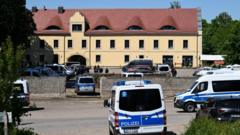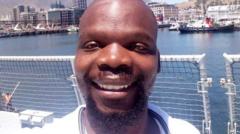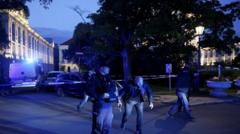In a significant crackdown on far-right extremism, German police have arrested the self-declared 'king' Peter Fitzek and members of his extremist group, the Reichsbürger, aiming to overthrow the state.
Germany Cracks Down on Extremist 'Kingdom' and Its Leaders

Germany Cracks Down on Extremist 'Kingdom' and Its Leaders
German authorities ban extremist group led by a self-proclaimed 'king'
On Tuesday, German police executed coordinated raids across seven states, resulting in the arrest of Peter Fitzek, 59, and three other leaders within the extreme-right faction known as the Reichsbürger, or "citizens of the Reich." The German government also declared the group, which envisions establishing the so-called Königreich Deutschland, or "Kingdom of Germany," to be illegal. This operation involved approximately 800 law enforcement personnel and was aimed at neutralizing what officials viewed as a serious threat to the nation’s democracy.
German Interior Minister Alexander Dobrindt condemned Fitzek and his followers for attempting to subvert state authority and propagate "antisemitic conspiracy narratives" to validate their claims to governance. The ministry cited the group's financial operations stemming from economic criminal activities as justification for its dissolution.
Fitzek, who famously crowned himself in 2012 and assumed the moniker "Peter the First," has gained notoriety for rejecting modern German laws, often flaunting his defiance through acts such as driving without a license to symbolize his departure from the established order. Advocating for an alternative state, the Reichsbürger have developed their own currency, flag, and proposed banking and health systems. Fitzek claims to have a sizable following, referring to them as his "subjects."
In past interviews, Fitzek has attempted to downplay any violent intentions, decrying the German state as "destructive" and labeling it a "fascist and satanic system." However, authorities have classified the Reichsbürger group as a growing security concern with an estimated 25,000 members, some of whom are suspected of being armed and having authoritarian tendencies. A previous plot involving the group included plans for a violent coup that sought to establish a civil war scenario to dismantle the government.
As Germany confronts rising far-right sentiments, officials have shifted their perspective on the Reichsbürger from eccentricity to a significant threat, prompting this decisive action against its ringleaders. The federal prosecutor's office has designated Fitzek as the group's "so-called supreme sovereign," reaffirming the crackdown's importance in safeguarding German democracy.
German Interior Minister Alexander Dobrindt condemned Fitzek and his followers for attempting to subvert state authority and propagate "antisemitic conspiracy narratives" to validate their claims to governance. The ministry cited the group's financial operations stemming from economic criminal activities as justification for its dissolution.
Fitzek, who famously crowned himself in 2012 and assumed the moniker "Peter the First," has gained notoriety for rejecting modern German laws, often flaunting his defiance through acts such as driving without a license to symbolize his departure from the established order. Advocating for an alternative state, the Reichsbürger have developed their own currency, flag, and proposed banking and health systems. Fitzek claims to have a sizable following, referring to them as his "subjects."
In past interviews, Fitzek has attempted to downplay any violent intentions, decrying the German state as "destructive" and labeling it a "fascist and satanic system." However, authorities have classified the Reichsbürger group as a growing security concern with an estimated 25,000 members, some of whom are suspected of being armed and having authoritarian tendencies. A previous plot involving the group included plans for a violent coup that sought to establish a civil war scenario to dismantle the government.
As Germany confronts rising far-right sentiments, officials have shifted their perspective on the Reichsbürger from eccentricity to a significant threat, prompting this decisive action against its ringleaders. The federal prosecutor's office has designated Fitzek as the group's "so-called supreme sovereign," reaffirming the crackdown's importance in safeguarding German democracy.


















